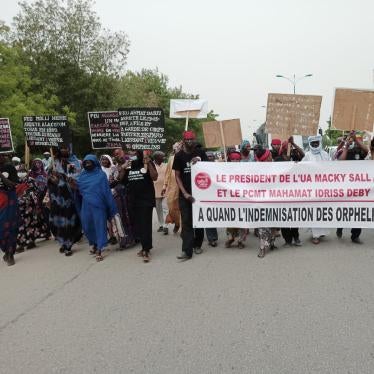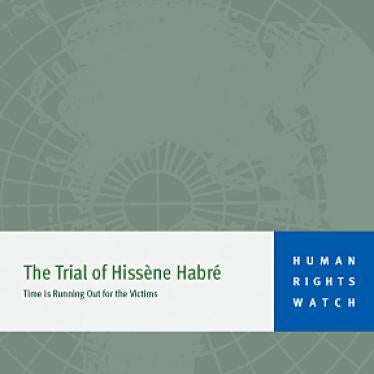(Nice) - Heads of state attending the France-Africa summit should make a strong commitment to provide justice for victims of human rights abuses and to bring perpetrators to account, Human Rights Watch said today.
The Conference of Heads of State of Africa and France will meet in Nice, France on May 31 and June 1, 2010.
"Unless African governments are willing to bring prosecutions for the worst human rights abuses, they will have a hard time achieving political stability and sustainable development," said Jon Elliott, Africa advocacy director at Human Rights Watch. "Impunity leads to conflict, corruption, and lives stunted by fear and intimidation."
Sudan, Chad, the Democratic Republic of Congo, and Guinea are among the countries where the perpetrators of massive human rights violations have not been held to account. The future of these countries is imperiled by the failure to reckon with the grave crimes committed, Human Rights Watch said.
The Nice summit coincides with the opening of the Review Conference on the Rome Statute, which created the International Criminal Court (ICC), in Kampala from May 31 to June 12. Human Rights Watch called on the countries represented in Nice to make a public commitment to independent national and international justice for grave human rights violations.
The France-Africa summit was originally scheduled to be held in Egypt, but the Egyptian government insisted on inviting President Omar al-Bashir of Sudan, who is being sought under an arrest warrant from the ICC. France changed the venue of the summit to France so that al-Bashir would not attend.
But Human Rights Watch said that France had yet to demonstrate its full commitment to accountability for grave international crimes by incorporating the Rome Statute's provisions into its national law so that people accused of war crimes or crimes against humanity abroad can be prosecuted in France. A draft law, which could be passed this week, has severe limitations that will make it very difficult to prosecute suspected war criminals found in France.
"A law that will allow suspected war criminals to continue roaming free on French territory is hardly something to be proud of," said Jean-Marie Fardeau, Paris director at Human Rights Watch. "The law should be adapted so that France can play its role in the fight against impunity."
Human Rights Watch commended France for its support of a United Nations inquiry after the massacre of opposition supporters by government security forces in Conakry, Guinea in September 2009, and encouraged France to promote justice similarly elsewhere in Africa where serious human rights violations occur.
"Millions of victims of atrocities in Africa are waiting for justice," Fardeau said. "France needs to demonstrate the political will to press for accountability by helping African states to hold perpetrators accountable."
While the focus of the France-Africa Summit is on the role of the private sector in Africa, official discussions will also examine the participation of African countries in international institutions, global warming and the environment six months after the Copenhagen Climate Conference, and France's role in strengthening security in Africa. Human Rights Watch said that promoting security requires countries to adhere to the rule of law and to develop independent and effective justice systems.
At the Nice summit, Human Rights Watch will press for action on specific cases where human rights abusers have escaped prosecution for heinous crimes:
- President al-Bashir of Sudan, who is wanted by the ICC on charges of war crimes and crimes against humanity in Darfur. While some governments, such as South Africa, have publicly said that they would arrest al-Bashir if he visits their territories, and many others have strongly advised him to cancel planned visits, the African Union has unfortunately asked the UN Security Council to suspend the case against him;
- Hissene Habré, the exiled former dictator of Chad, who is accused of thousands of political killings and systematic torture. It has been over 10 years since he was first indicted in Senegal, and almost four years since the African Union called on Senegal to try Habré "on behalf of Africa," but Senegal has failed to move the case forward;
- Bosco Ntaganda, a former Congolese warlord wanted by the ICC, who is now a top military commander in the army of the Democratic Republic of Congo and plays a leading role in military operations in eastern Congo backed by UN peacekeepers;
- Perpetrators of the September 2009 violence in Guinea, in which 150 to 200 opposition supporters were massacred and about 100 women raped in a Conakry stadium. While the government has made a commitment to investigate and bring the perpetrators to justice, it has yet to arrest those most centrally linked to the violence, and two key alleged perpetrators continue to hold government positions;
- The longtime dictator of Equatorial Guinea, President Teodoro Obiang Nguema, who has escaped punishment for the vast official corruption that has allowed him to accumulate immense wealth while the vast majority of the population needlessly suffer crushing poverty;
- The army officials behind the forcible disappearance of the Chadian opposition leader, Ibni Oumar Mohamat Saleh, in February 2008. The case has not been resolved, and Saleh is feared dead. Despite the in-depth work done by an independent commission of inquiry, the Chadian government has failed to facilitate judicial investigations;
- Ethiopia's military forces, who have been implicated in numerous war crimes and crimes against humanity in the Somali and Gambella regions and also in neighboring Somalia. There have been no domestic, regional, or international efforts to investigate and prosecute those responsible;
- Nigerian officials implicated in the massive embezzlement of state funds, including the former Delta State governor James Ibori and former Rivers State governor Peter Odili. The government has failed to prosecute these officials;
- Internal security forces in Tunisia, who have not been held accountable for violence and torture against human rights activists and journalists;
- Those responsible for the cycles of violence and reprisal in Burundi, where lack of access to justice for human rights abuses and war crimes has led to repeated violence for nearly 50 years.







